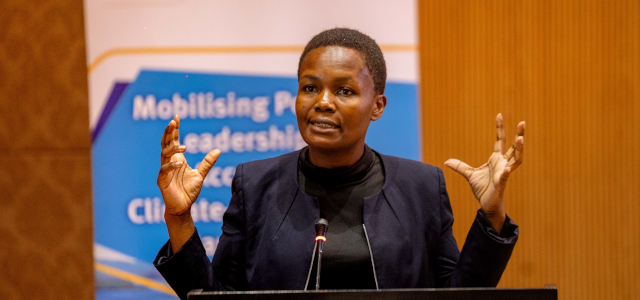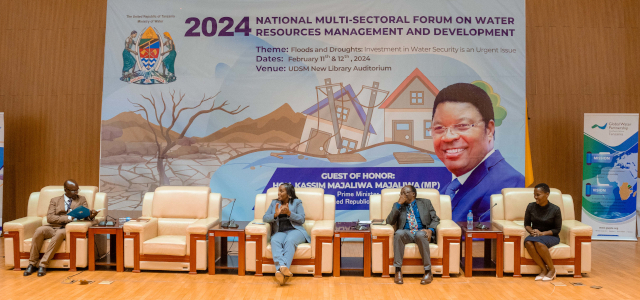The strategies are responding to the following three major barriers in Tanzania:
(i) Inadequate Funds to Implement Resilient Water Resources Investments,
(ii) Inefficient irrigation water uses and practices: the case of Ruvu Sub-Basin, and
(iii) Overlapping Legal and Regulatory Mandates Impacting Inter-Sectoral Coordination.
Speaking during a session titled; “Reflections and Progress made in advancing National Multi-Sectoral Forum and post-Mbeya Declarations,” GWL Tanzania Coordinator, Ms. Asha Mercy Msoka explained that the process to develop the strategies involved the formation of working groups, each of which did a root cause analysis of their assigned barrier, developed action plans, and worked with a finance consultant to develop corresponding finance plans.

Ms. Mercy Asha Msoka, GWL Coordinator in Tanzania making a presentation on the response strategies
“The Response strategies contain action plans of specific tasks and activities designed to achieve defined goals and objectives, serving as an effective and efficient roadmap for project or strategy implementation. Additionally, the financing plans comprise of costing the resources required for activities and determining financing options or sources of funds,” she explained.
According to the strategies, solving the barrier on inadequate funds to implement resilient water resources investments will require TZS 72 billion (USD 28 million), of inefficient irrigation water uses and practices in Ruvu sub-basin needs about TZS 462 billion (USD 181 million) and the barrier on overlapping legal and regulatory mandates impacting inter-sectoral coordination requires about TZS 2 billion (USD 787 000).
Financing sources according to the strategies will include public finance, climate finance, NGOs, National Water Fund and development partners.
“The Response Strategies will now be integrated into appropriate strategies into national planning processes and roadmaps for implementation. The guest of honour, His Excellency Kassim Majaliwa, Prime Minister of the United Republic of Tanzania affirmed that the Resolutions from the National Multi Sectorial Forum will be submitted to an inter-ministerial committee for further action. The strategies are also speaking to several focus areas in the Tanzania Water Investment Programme such as Focus Area 1: Water Investment for social well-being and development to the achievement of TanWIP target, Focus Area 2: Water Investment for sustainable economic development, Focus Area 3: Water governance and institutional strengthening and Focus Area 4: Resilience for sustainable development through water Investments. The response strategies are therefore critical to the achievement of TanWIP target,” explained Ms. Msoka.
The Government of Tanzania is set to launch a USD 15 billion National Water Investment Programme (TanWIP) to enhance water security through the mobilisation of resources, foster multi-sectoral collaboration, and promote sustainable water management practices.
The TanWIP will invest the resources in Tanzania’s water sector from 2023 to 2030 and will leverage technical and financial contributions from both the public sector and its partners. The programme is in alignment with the country’s SDG targets and long-term development goals.
